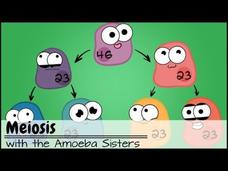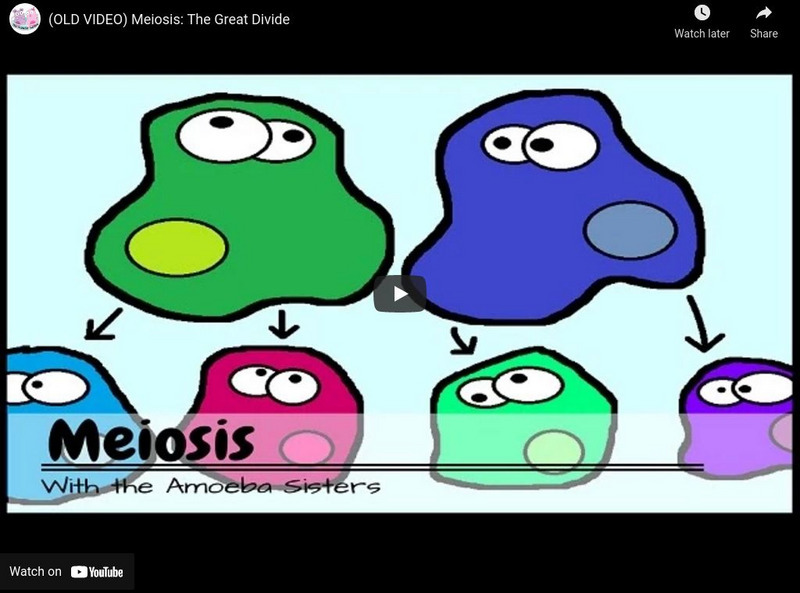Amoeba Sisters
Meiosis
Why do siblings often look so different from one another? Discover the process of making gametes using a short video from a large biology playlist. The narrator explains each step while animated chromatids play out the scenario that...
PBS
How Sex Became a Thing
Birds, bees, flowers, trees ... and Funisia dorothea? Biology scholars journey back in time to discover more about the history of sexual reproduction. The video, one of many in a biology playlist, covers our earliest eukaryotic ancestor,...
FuseSchool
Genetics and Cell Division Keyword Definitions
Scholars often find new vocabulary overwhelming—help break it down for them. A helpful video addresses the vocabulary associated with genetics and cell division. It offers the definition of each and a short explanation. Cartoon graphics...
FuseSchool
Sperm and Eggs Cells
A human egg cell measures more than 30 times the size of a human sperm cell. An engaging video in the Fuse School playlist discusses the differences between sperm and egg cells. It highlights the reasons for the differences as they come...
Teacher's Pet
Mitosis and Meiosis
Use chromosomes in marketing because as you know, sex cells. The video explains both mitosis and meiosis. It focuses on both the similarities and the differences in the process of forming sperm, egg, and zygote.
Teacher's Pet
Formation of Gametes
The smallest cell in a human body is sperm while the largest cell in a human body is an egg. The video discusses the formation of gametes from a scientific perspective. It includes the process of spermatogenesis, oogenesis and concludes...
Teacher's Pet
Stages of Meiosis
During meiosis, one cell divides twice, forming four daughter cells. The video explains the stages of meiosis in great detail. It begins with interphase and DNA replication, meiosis I, meiosis II, and finally the four haploid cells.
Amoeba Sisters
Punnett Squares and a Dihybrid Cross
Cats have a reputation for avoiding water, but did you know many cats love sinks? A video explains how to solve 16-square Punnett square problems with a dihybrid cross. It includes Mendel's Law of Segregation and Mendel's Law of...
Amoeba Sisters
Meiosis: The Great Divide
Learning about meiosis requires your undivided attention. The video covers meiosis including detail about all eight phases. It provides compare-and-contrast examples between meiosis and mitosis.
Curated OER
Genetics
Has your class finished its unit on genetics? Use this resource to provide a quick, encompassing review. Mr. Anderson discusses DNA, RNA, nucleotides, mitosis, meiosis, diploids, haploids, gametes, gene expression, etc. Create a...
Curated OER
Animation of Meiosis
Demonstrate the cell division and phases of meiosis by showing this video clip. An animated cell splits as chromosomes line up and are pulled apart by spindles. Help your young biologists see just how meiosis works.
Khan Academy
Khan Academy: Cell Division: Mitosis, Meiosis and Sexual Reproduction
Gain an understanding of mitosis, meiosis and sexual reproduction. Vocabulary introduced gametes, zygotes, and haploid / diploid numbers.
Amoeba Sisters
Amoeba Sisters: Meiosis
This video will guide students through the process of meiosis. Understand why meiosis is called the reduction division and how it produces unique cells. Also discussed in the video is the differences and similarities between mitosis and...
Sophia Learning
Sophia: Female Reproductive System: Lesson 2
This lesson will introduce the female reproductive system as well as give an overview of the organs and glands associated with the female reproductive system. It is 2 of 5 in the series titled "Female Reproductive System."













